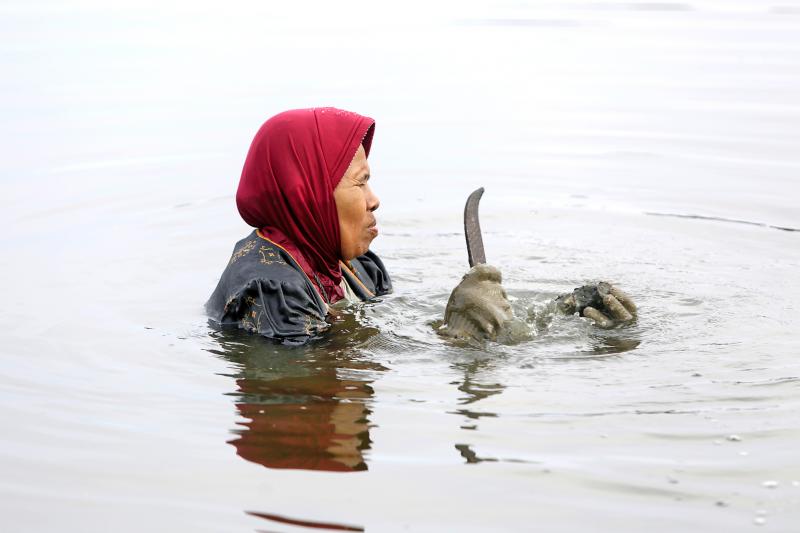People in well-off countries can help avert climate breakdown by making six relatively straightforward lifestyle changes, according to research from three leading institutions.
The study found that sticking to six specific commitments — from flying no more than once every three years to only buying three new items of clothing a year — could rein in the runaway consumption that is partially driving the climate crisis.
The research carried out by academics at Leeds University and analyzed by experts at the global engineering firm Arup and the C40 group of world cities, found that making the six commitments could account for a quarter of the emissions reductions required to keep the global heating down to 1.5 Celsius.

Photo: AP
The study was published on Monday alongside the launch of a new climate movement to persuade and support relatively well off people to make “The Jump” and sign up to the six pledges.
Tom Bailey, co-founder of the campaign said: “This ends once and for all the debate about whether citizens can have a role in protecting our earth. We don’t have time to wait for one group to act, we need ‘all action from all actors now.’”
Last week the Intergovernmental Panel on Climate Change (IPCC) issued its “bleakest warning yet,” saying the climate crisis was accelerating rapidly with only a narrow chance left of avoiding its worst ravages.

Photo: EPA-EFE
Bailey said as the world reaches the edge of ecological collapse, it needed a workable alternative to this “universal consumer society” in the next decade.
“The research is clear that governments and the private sector have the largest role to play but it is also equally clear from our analysis that individuals and communities can make a huge difference,” he said.
The Jump campaign asks people to sign up to take the following six “shifts” for one, three or six months:
■ Eat a largely plant-based diet, with healthy portions and no waste
■ Buy no more than three new items of clothing per year
■ Keep electrical products for at least seven years
■ Take no more than one short haul flight every three years and one long haul flight every eight years
■ Get rid of personal motor vehicles if you can — and if not, keep hold of your existing vehicle for longer
■ Make at least one life shift to nudge the system, like moving to a green energy, insulating your home or changing pension supplier
The campaign was officially kicked off on Saturday and Bailey said there was already a growing movement emerging in response to the evidence with Jump groups up and running around the country.
“This is not just new information, or a normal behavior change ‘campaign,’ but a fun movement that is working to go way beyond the usual ‘greenie’ suspects,” said Bailey. “A movement that is able to engage all types of people … engaging and being led by communities of color and the economically excluded.”
Bailey said there has been a widespread belief in climate circles in recent years that individual action was relatively ineffective and the only option was to get out on the streets and demand system change from governments and corporations.
“Obviously this is still hugely important but what this research shows is that there is a role for a new joyful climate movement which can help lead the way to less stuff and more joy.”
Some of the shifts the campaign calls for are, at least partially, dependent on systemic change — the prohibitive cost of train fares might leave individuals with little choice but to use short haul flights for essential journeys; public transport maybe expensive or nonexistent in areas of the country, leaving people with no choice but to use their car.
Bailey was the lead author of Labor’s plan to decarbonize the UK’s energy sector at the last election. He has worked in the green energy sector in the UK, US and China for the past 15 years, and said individual actions could have a cascade effect, leading to community level action and ultimately contributing to systemic change.
Although not everyone would be able to commit to all the pledges, just “making a start” could have a big impact, he said.
The research is based on a study by academics at Leeds University, Arup and the C40 group of leading cities which assesses the impact of consumption by people in the world’s leading cities.
Analysis of that data has found that six steps set out above could cut global emissions by between 25 percent and 27 percent.
Ben Smith, director of climate change at Arup, who led the analysis said that as scientific evidence mounts, it was clear that all sections of society had to act.
“Our research shows that all of us, from politicians, city and business leaders to individual citizens, have important roles to play. And it is clear there’s lots that we can do as individuals, and that this is one of the easiest and quickest places to start.”

Behind a car repair business on a nondescript Thai street are the cherished pets of a rising TikTok animal influencer: two lions and a 200-kilogram lion-tiger hybrid called “Big George.” Lion ownership is legal in Thailand, and Tharnuwarht Plengkemratch is an enthusiastic advocate, posting updates on his feline companions to nearly three million followers. “They’re playful and affectionate, just like dogs or cats,” he said from inside their cage complex at his home in the northern city of Chiang Mai. Thailand’s captive lion population has exploded in recent years, with nearly 500 registered in zoos, breeding farms, petting cafes and homes. Experts warn the

No one saw it coming. Everyone — including the Chinese Nationalist Party (KMT) — expected at least some of the recall campaigns against 24 of its lawmakers and Hsinchu Mayor Ann Kao (高虹安) to succeed. Underground gamblers reportedly expected between five and eight lawmakers to lose their jobs. All of this analysis made sense, but contained a fatal flaw. The record of the recall campaigns, the collapse of the KMT-led recalls, and polling data all pointed to enthusiastic high turnout in support of the recall campaigns, and that those against the recalls were unenthusiastic and far less likely to vote. That

The unexpected collapse of the recall campaigns is being viewed through many lenses, most of them skewed and self-absorbed. The international media unsurprisingly focuses on what they perceive as the message that Taiwanese voters were sending in the failure of the mass recall, especially to China, the US and to friendly Western nations. This made some sense prior to early last month. One of the main arguments used by recall campaigners for recalling Chinese Nationalist Party (KMT) lawmakers was that they were too pro-China, and by extension not to be trusted with defending the nation. Also by extension, that argument could be

Aug. 4 to Aug. 10 When Coca-Cola finally pushed its way into Taiwan’s market in 1968, it allegedly vowed to wipe out its major domestic rival Hey Song within five years. But Hey Song, which began as a manual operation in a family cow shed in 1925, had proven its resilience, surviving numerous setbacks — including the loss of autonomy and nearly all its assets due to the Japanese colonial government’s wartime economic policy. By the 1960s, Hey Song had risen to the top of Taiwan’s beverage industry. This success was driven not only by president Chang Wen-chi’s